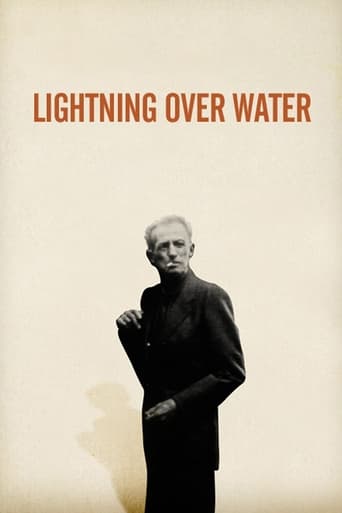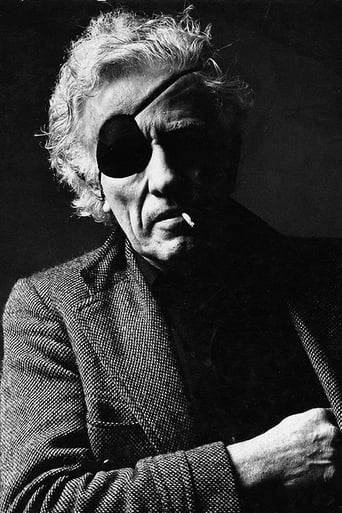

Lightning over Water (1980)
Director 'Nicholas Ray' is eager to complete a final film before his imminent death from cancer. Wim Wenders is working on his own film Hammett (1983) in Hollywood, but flies to New York to help Ray realize his final wish. Ray's original intent is to make a fiction film about a dying painter who sails to China to find a cure for his disease. He and Wenders discuss this idea, but it is obviously unrealistic given Ray's state of health.
Watch Trailer
Cast
Reviews
Too much of everything
Fun premise, good actors, bad writing. This film seemed to have potential at the beginning but it quickly devolves into a trite action film. Ultimately it's very boring.
If you like to be scared, if you like to laugh, and if you like to learn a thing or two at the movies, this absolutely cannot be missed.
Through painfully honest and emotional moments, the movie becomes irresistibly relatable
Lightning Over Water began as a collaborative idea to tell the story of a dying painter who steals art from museums and replaces them with his own forgeries. Suffering from terminal cancer himself, Ray's health quickly deteriorates during the project. The film eventually ceases to be a work of fiction and becomes a documentary of Ray's finals days in which he fittingly spends making film. In reflecting over his career and life, Ray ponders his successes and failures as a film maker who is best known for Rebel Without a Cause (1955). A poignant and often disturbing film, Lighting Over Water is ultimately a painful homage to a film maker and to a friend (Klaus Ming March 2013).
In this film documentary, Wim Wenders comes to New York City to visit film director, Nicholas Ray, who directed classics like Rebel Without a Cause starring James Dean. Ray lives in a Soho loft with his younger wife, Susan Ray. You could see the twin towers that once stood at the foot of Manhattan long before it's destruction in 2001. Nick Ray is stubborn and determined to make a final film. In some ways, it's his last chance in the cinema. Wim Wenders knows time is of the essence sine Ray is dying of cancer. There are candid moments of Ray dying but not letting his cancer destroy him. Wenders is a friend and film director. This documentary is really more of a tribute than anything else to a fine film director even though we didn't get to really know him. I haven't seen any of his films to date. The documentary might be dated but it's important to recognize a man who was really a genius in the film industry even thirty years later. He didn't live like a millionaire. He lived quite modestly and on his own terms which is how he died.
Halfway through the movie, I told my girlfriend who wasn't watching it, "this movie could be called 'Watch Nick Ray smoke'". What is this movie about? That's the question, which is the subject of this movie. One man, the legendary Hollywood director Nick Ray, is dying and the other, up-and-coming German director Wim Wenders, is trying to help him make a movie. They can't seem to figure out what the movie should be about. Ray thinks it should be about an elderly painter, unable to recapture past success, who robs his masterpieces from museums and replaces them with his own forgeries. The artist has a wife who is 40 years younger than he is, and he's dying from cancer. Wenders urges him to drop the fictional facade, since the character is obviously Nick Ray himself. Watching it, we're not sure if Ray and Wenders are genuinely disagreeing about the film's subject, or if this is all scripted and actually the film itself.And so the subject of the film is the idea of the fictional barrier or the artist's personal incentive and responsibility towards the art. It's a great statement about Ray's method of work as a director, the impulsive nature of it and his great insight into working with what he calls the "high caliber" talents of Hollywood, and we can't really disagree with him seeing the names -- Bogart, Mitchum, Dean. Ray offers that the personal investment and connection of the actor to the character and the situation is what anchors the performance and makes it great. In a standard narrative film, the separation between the actor and his/her role could thus be seen as even more the trick than it first appears to be, and much on the same order of trickery as this film itself, with its obvious "documentary" overtures and its real documentary value existing in an uneasy middle ground. As we watch Nick Ray basically die before the camera, Wenders offers that the merciless eye of the camera may capture more of the process of disintegration than the eye itself. That's what makes watching this film such a sad experience, particularly for myself and others who are fans of Ray but I'm sure for Ray's family in a totally different way, and for those who might never have heard of him in yet another way.Wenders' film touches upon very big questions and feels like it's getting closer to some very vital territory, but it never really takes off and soars. There's no moment of clarity or consciousness. Instead the very lack of clarity becomes the subject of the film even to its conclusion with a (probably faked) confrontation between the crew with some urging to burn (Ray's?) boat so that it would provide a fitting climax for the film. Ray wanted to make a film about self-examination, but Wender's "Lightning Over Water" ends up feeling like a sad and perversely voyeuristic experience with plenty of self-examination and no self-realization. I have to say that it sobered me up quite a bit, and it's quite an experience of a film for me, but I'm dubious about whether it's really the film that Ray and Wenders hoped that they were making.
Wenders gives the viewer the impression that this is a simple movie, but it is not. Fans of Wenders will recognize director Nicholas Ray's apartment as a location for the film, American Friend. But not only is Ray simply dying, he dies, and the "documentary" has to change, and so it does, with grace, pain, uncertainty, and a host of other emotions and observations. The music, much of it featuring Ronee Blakley, doing what sounds like an attempt at light punk rock and country-folk rock, with a definite Patti Smith influence, is very effective. Like every film I have seen by Wenders, it looks beautiful and often unusual, and the pacing is leisurely, and by Hollywood standards, slow. However, anyone who likes Wenders and likes Ray--and let's face it, if you say you are a fan of American film, and you neither like nor know Nicholas Ray, you are an ignorant piker, poser--will benefit from screening this movie, and probably be moved like hell by it.


